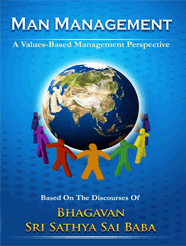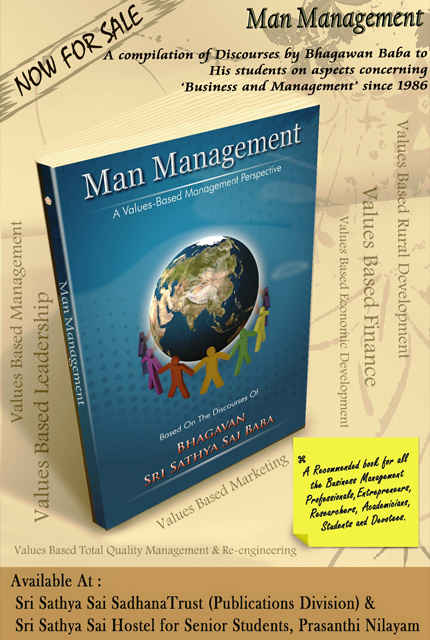MAN MANAGEMENT
Introduction
EXCERPTS FROM THE PREFACE TO THE BOOK
What determines professional success? Is it primarily one’s academic qualifications, technical competence in chosen field; or personality characteristics; or ability to manage efficiently the resources of the organisation; or a combination of all aforementioned factors? Many of us now, and many in the past must have pondered over these questions for a long time without arriving at a convincing answer. All those who are genuinely seeking answers for the aforesaid questions would find proper answers in this book provided they go through the material in a diligent manner. Baba explains in a convincing way that it is ‘Man-Management’ which in turn depends on ‘Self-Management’ that enables executives to achieve professional success. The content of this book is based on the discourses delivered by Bhagavan Sri Sathya Sai Baba, Revered Founder Chancellor, Sri Sathya Sai Institute of Higher Learning, to the students and faculty of the School of Business Management, Accounting and Finance (now rechristened Department of Management Studies), Sri Sathya Sai Institute of Higher Learning, Prasanthi Nilayam, on various occasions over the last two and half decades. The matter for some of the chapters such as: Role of Values in Management Education: Insights from the Business School at Sri Sathya Sai Institute of Higher Learning, Watch Method of Transformational Leadership, and Manager and Mind Control is gathered from different discourses of Baba and put together in this book with the intention that readers should get the benefit of such crucial aspects, critical for managerial excellence, regarding which Baba has offered very inspiring insights.
Of all the 6 M’s of management, viz. men, money, materials, machines, methods and markets, men (symbolising human beings) are the most important factor, for it is the human resources of an organisation that determine the effective utilization of the remaining five M’s. Baba says, “Men are more valuable than all the wealth of the world.” He characterizes management as ‘Man Management’ and as such, He fondly refers to the management programme as ‘Master of Man Management’ (MMM), in lieu of Master of Business Administration (MBA). At the time of inaugurating the Institute, Baba had said, “This Institute has not been established just to prepare you (students) for earning degrees. Its main purpose is to help you cultivate Self-knowledge and Self-confidence so that each one of you can learn self-sacrifice and earn Self-realisation.” Likewise, the mission of the MBA programme at the Institute is ‘to develop dedicated, dynamic, professionally sound and socially responsible leaders of wholesome and balanced personality; academically equipped as well as spiritually aware, who embody noble values, and above all, possess a right and positive attitude with an unblemished character.’
The uniqueness of the Management Programme at the Institute is thus its stress on Man Management, selfless service and superior moral caliber. Therefore, ‘Man Management: A Values-Based Management Perspective, Based on the Discourses of Sri Sathya Sai Baba’ is chosen as the title of the book. In the original discourses delivered by Baba in Telugu, there was purity, originality, richness, nativity and humour that may not be possibly preserved in a transcript in a foreign language entirely, owing to the inherent limitations that appear in translation from one language to another. One has to bear in mind, at this juncture, that any compilation lifts some of the words out of context and takes away some of their original depth and meaning. However, all human effort has been made, as earnest instruments in His hands, to convey His Message in an accurate and authentic manner, preserving its uniqueness, originality and freshness. However, despite all such care, if any inaccuracies appear here and there, they would have occurred owing to the human errors in compilation and limitations in comprehending the deep significance of the Master’s words.
It should be mentioned at this juncture, that different Sanskrit words and other English expressions used in this book such as Bhagavan, Swami, Baba, Sai, Revered Founder Chancellor, etc. all refer to Sri Sathya Sai Baba, the Creator of this great work. In a similar way in this work, whenever many expressions and statements are made by using words like mankind, man, he, him, his, etc., care is taken to use neutral expressions like humankind, human or inclusive expressions like man/woman, he/she, him/her, his/her, etc., wherever possible. But in certain places, if it is not done that way, no gender discrimination or insensitivity is intended.
It is said that management education in India makes use of courses, course material and teaching material adopted mostly in western universities that cannot be transplanted synthetically in India. Therefore, there is a requirement on the part of all stakeholders concerned with management education in India to place together all the material suitable to the cultural values and milieu of India and the Indian society. Baba is the right person to deal with the current issues of management in the backdrop of Sanatana Dharma relevant to today’s environment not only to India, but also to the whole world. The contents in this work are not dealt with in the usual business approach per se, which we find in routine management literature. They have been dealt with from the standpoint of human values steeped in a spiritual perspective. Baba insists that if today’s managers have individual and national character, and love for God and fear of sin, they will become successful leaders. They will create effective teamwork and accomplish the objectives of organisations impelled by higher order goals.
Baba looks at the issues of society and modern business more from the standpoint of the individual reformation, which is termed as ‘internal locus of control’ in the jargon of Organisational Behaviour. It should be reiterated here that this individual transformation would be long lasting only when it is based on a spiritual perspective, which in the conviction of tradition would surely go a long way in identifying the root cause of problems instead of scraping the apparent symptoms, which are taken for the root cause. The modern world is encountering various problems in different sectors including business because of a crisis in human values, and as such, if human values are set in proper order, then the problems troubling people today can find suitable solutions, whatever may be the field concerned. Baba compares the functioning of business to the functioning of a human body and explains that business has to function like the different limbs and organs of the human body, which ‘co-opete’ (cooperate + compete) with one another as sub-systems of the overall system but work for the overall success and well-being of the human body.
Baba’s expansion of the term ‘MANAGER’ using it as an acronym is unique and useful for any executive working in any business sector and any part of the world. If only a practicing manager could develop the mind of man, awareness of Atman, an understanding about nature of nations and aspects of environment, follow the guidelines of goodness and cultivate an enquiry into ethos of the nation, and an appreciation regarding role of rules, there would be an all-round improvement and peace in society. Similarly, if people can comprehend the message that WATCH (used as an acronym) provides and cultivates those traits; they would be able to mould themselves into good leaders.
Part I of this book deals with the nature of society and business in relation to India. It provides the basic canvas of values-based economic development as the foundation for the development of rural India as well as socially responsive business. India’s economic problems could be attributed to low motivation, morale and commitment of people. The lasting solutions to economic problems can be found only in spirituality. Morality in human beings should be nurtured so as to influence the quality of several dimensions of societal activity. Every individual largely depends on the society for the fulfillment of his/her needs. The economic and business development of any country with particular reference to India depends on the development of people in rural areas as they constitute 80% of its total population. There is a great need to educate the rural people in India to earn their bread through agriculture and agro-related businesses, and thereby contribute to the growth of the villages. In every field in the society today, rapid money-making appears to have become the main objective. Why are business organisations subjected to vicissitudes despite the presence of well qualified human resources with good academic qualifications, capabilities, skills and abilities to deal with such situations effectively? Perhaps the causes for all such risks and uncertainties relating to business could be attributed to the decline of human values.
Part II focuses on the conceptual background of values-based business in India. It covers the art and science of management in ancient India, and the fundamentals of business management and organisation.
Part III presents values-oriented business and management from the standpoint of ancient Indian wisdom, providing values-oriented inputs with particular reference to finance and marketing in modern business and industrial organisations.
Part IV describes the ideal life style of a leader-manager from a spiritual perspective, the characteristics and significance of a values-based manager, the process of human development, and the work life and private life issues of a modern executive.
Part V presents ‘Factors and Issues Contributing to Excellence in Management: Individual Facet’. It reviews personality and its development, self-concept, and the role of self-management in man management.
Part VI presents ‘Factors and Issues Contributing to Excellence in Management: Organisational Facet’. It deals with human factor management, social culture and work culture in relation to management.
Part VII presents the Indian school of thought with respect to means of achieving excellence in management. It elaborates the lessons that can be drawn from ancient Indian wisdom with reference to Total Quality Management and Re-engineering.
Part VIII presents the significance of mind-control and the ‘WATCH’ method of transformational leadership in the lives of modern executives in accomplishing individual, organisational and societal objectives. It also presents the role of Educare in management education in India and the insights that can be drawn in this regard from the Department of Management Studies at Sri Sathya Sai Institute of Higher Learning have been presented.
Part IX presents Baba’s specific guidelines to corporate executives regarding the need and significance of ethics and morality and their role and responsibilities in the contemporary world.
Each of the chapters in these nine parts has been compiled based on the discourses given by Baba to the students and staff of the Department of Management Studies. At the end of each chapter, a list of references has been provided for the benefit of the reader. Each reference consists of the theme of the discourse given by Baba, the occasion, venue and the date of the discourse.
This book is intended for all those with a hunger for knowledge and also those who are seeking genuine and sustainable solutions for chronic struggles and problems in personal and professional lives across the globe. It is hoped that the contents of this book, would fill the gap prevailing in the field of management literature, and inspire academicians, managers and business owners to pause and contemplate about the role of ancient Indian perspectives while dealing with different work-related issues pertaining to individual, organisational and societal dimensions.
Baba exhorts that reformation of the society begins with the individual first and if people change, then things would fall in their proper place. It is hoped that this book would be useful to refresh the journey of academicians, researchers and working executives on the highway of Man Management.
Prof. Racherla Kumar Bhaskar
Head, Department of Management Studies
Faculty of Management and Commerce
Sri Sathya Sai Institute of Higher Learning
Prasanthi Nilayam




